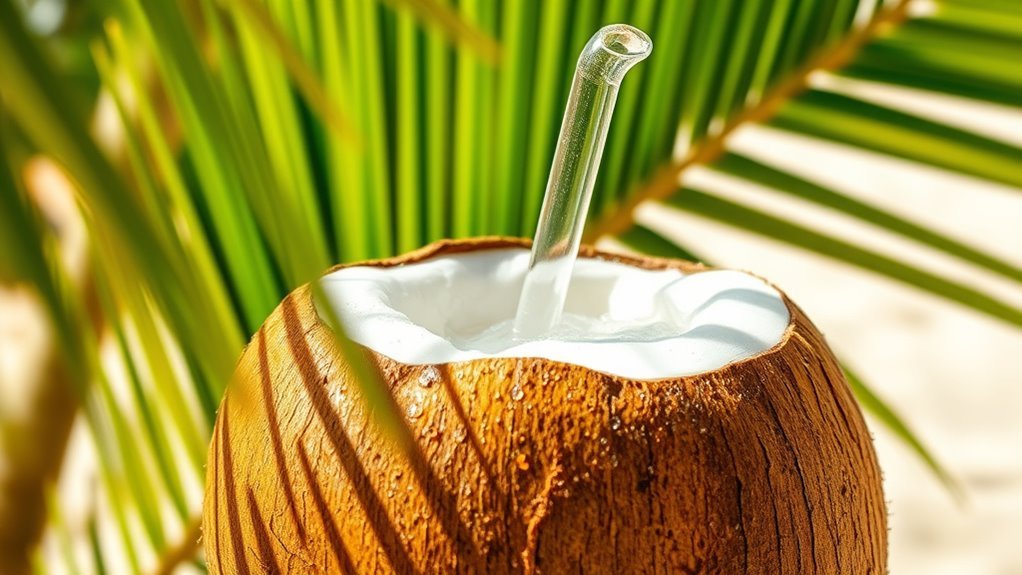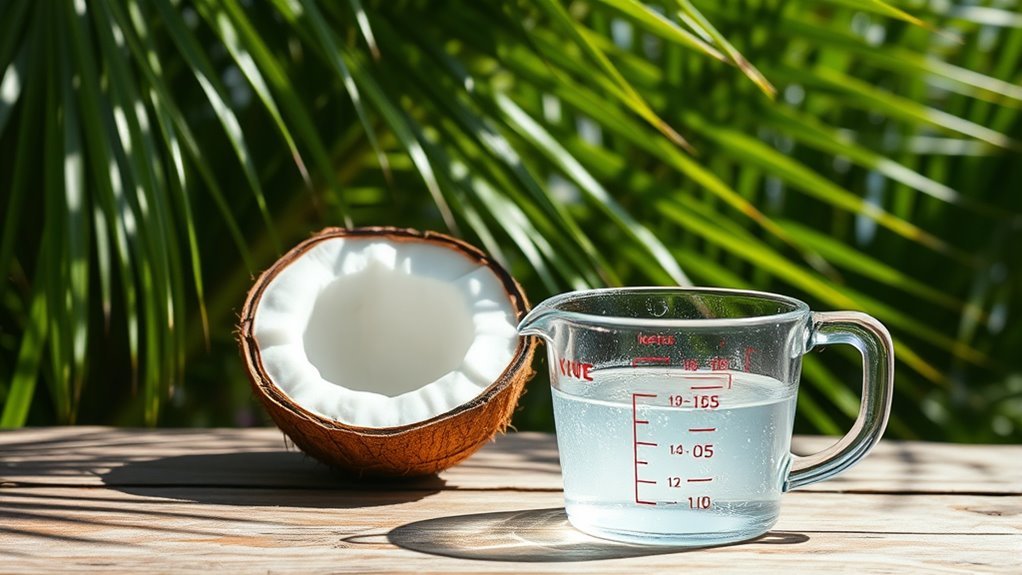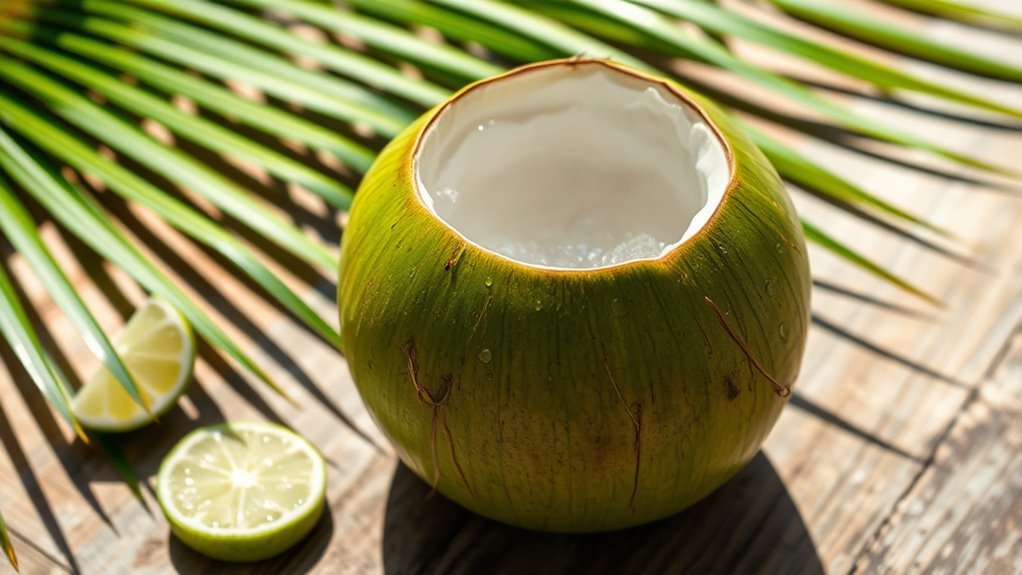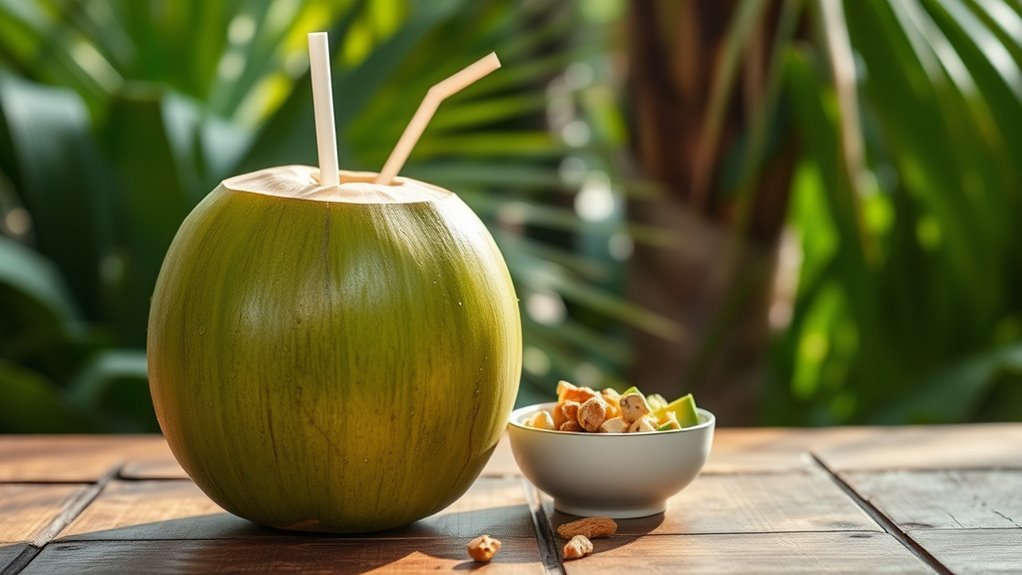You can drink coconut water on keto, but you’ll need to be mindful of its carbohydrate content. One cup has about 9 grams of carbs, which can impact your daily limit. While it’s hydrating and rich in electrolytes, moderation is key to staying in ketosis. Consider limiting your intake to around ¼ cup, or using it post-workout. There are also low-carb alternatives that can keep you hydrated, and there’s more to explore about this topic.
Understanding the Nutritional Profile of Coconut Water

When you consider incorporating coconut water into your keto diet, it’s crucial to understand its nutritional profile. Coconut water is often praised for its hydration benefits, providing essential electrolytes like potassium and magnesium. In a nutritional comparison, while it’s lower in calories than many sugary drinks, it still contains carbohydrates, typically around 6 grams per cup. This can impact your daily carb limit on keto. The coconut water benefits include improved hydration and replenishment after workouts, but its carb content means moderation is key. If you’re seeking a invigorating beverage, coconut water can be a delightful option, but balance it with your overall dietary goals to guarantee you maintain that sense of freedom in your keto lifestyle. Additionally, be mindful that daily carb limit for ketosis typically ranges from 20-50 grams, making careful portion control essential.
Carbohydrate Content and Keto Compatibility

Coconut water’s carbohydrate content plays a significant role in determining its compatibility with a keto diet. While it’s hydrating and invigorating, you should consider its carbohydrate impact before indulging. Here are some key points to keep in mind:
- Carbohydrate Content: One cup contains about 9 grams of carbs.
- Net Carbs: After accounting for fiber, you’ll still ingest around 8 grams of net carbs.
- Keto Limit: Most keto diets restrict daily carb intake to 20-50 grams, making coconut water a substantial portion.
- Moderation is Key: If you love coconut water, enjoy it in small amounts and balance it with other low-carb foods.
Understanding these factors can help you decide how coconut water fits into your keto lifestyle without compromising your goals.
Health Benefits of Coconut Water

Coconut water is an excellent option for staying hydrated, especially after exercise, due to its natural electrolyte content. It’s rich in essential nutrients like potassium, magnesium, and calcium, which can support your overall health. Incorporating it into your diet may help maintain electrolyte balance while providing a revitalizing taste.
Hydration and Electrolyte Balance
Although many people think of water as the go-to for hydration, coconut water offers a uniquely beneficial alternative, especially for those on a keto diet. It’s a great option for your hydration strategies, providing essential electrolytes that help maintain balance. Here are some key benefits:
- Rich in Potassium: Supports muscle function and helps prevent cramps.
- Natural Sodium: Aids in maintaining fluid balance during low-carb diets.
- Magnesium Source: Promotes relaxation and can alleviate fatigue.
- Low in Calories: Keeps your hydration light without spiking sugar levels.
Incorporating coconut water can enhance your electrolyte sources while keeping your hydration levels ideal. It’s a revitalizing way to support your body’s needs on a keto journey without sacrificing your freedom to enjoy flavorful beverages. Additionally, coconut water has a low carbohydrate content, making it a suitable choice for those looking to maintain ketosis on a diet.
Nutrient-Rich Beverage Benefits
When you’re looking for a revitalizing beverage that also delivers a wealth of nutrients, coconut water stands out as an excellent choice. It’s packed with electrolytes like potassium and magnesium, which support hydration benefits essential for overall wellness. These electrolytes not only help replenish lost fluids but also enhance nutrient absorption in your body, making it easier to utilize the vitamins and minerals from your diet. Additionally, coconut water contains antioxidants that combat oxidative stress, promoting better health. While it’s naturally low in calories, it offers a rejuvenating alternative to sugary drinks, providing you with a guilt-free way to stay hydrated. Incorporating coconut water into your routine can be a simple yet effective way to boost your nutrient intake.
Hydration and Electrolyte Balance
Staying properly hydrated is essential on a keto diet, especially since the body tends to excrete more water and electrolytes during the initial stages of carbohydrate restriction. To maintain hydration and electrolyte balance, consider these effective hydration strategies:
- Drink plenty of water throughout the day to support overall hydration.
- Incorporate electrolyte sources like bone broth, leafy greens, and avocado to replenish lost minerals.
- Use electrolyte supplements if you’re feeling sluggish or experiencing cramps.
- Monitor your sodium intake to help retain water and prevent dehydration. Additionally, it’s important to recognize that coconut water’s carbohydrate content can impact your daily intake on keto, so consume it mindfully.
Moderation: How Much Coconut Water Can You Enjoy?
While coconut water is often praised for its hydrating properties and electrolyte content, it’s important to consume it in moderation on a keto diet. Since coconut water contains carbohydrates, sticking to moderation strategies is key. You might consider limiting your intake to a small serving, around ½ cup, to maintain your daily carb limits. This encourages portion control without sacrificing the benefits of hydration. To better manage your consumption, you can mix coconut water with water or use it in smoothies to enhance flavor without overindulging. Remember, finding the right balance allows you the freedom to enjoy coconut water while staying aligned with your keto goals. Additionally, incorporating nutrient-dense vegetables into your diet can help you meet your vitamin and mineral needs while enjoying occasional treats. Embrace moderation, and you’ll strike the perfect harmony for your lifestyle.
Alternatives to Coconut Water on a Keto Diet
If you’re looking for alternatives to coconut water on a keto diet, there are plenty of low-carb hydration options available. You might consider electrolyte-rich drinks or flavorful keto beverages that can keep you hydrated without the extra carbs. Exploring these alternatives can help you maintain your electrolyte balance while enjoying tasty drinks that fit your dietary needs. Staying hydrated is crucial since electrolyte balance can be affected by the diuretic effect of ketosis.
Low-Carb Hydration Options
When you’re on a keto diet, finding low-carb hydration options can be challenging, especially if you’re used to the invigorating taste of coconut water. Luckily, there are several revitalizing alternatives that fit your hydration strategies. Here are four low-carb drinks you might enjoy:
- Sparkling Water: Add a splash of lemon or lime for flavor without carbs.
- Herbal Tea: Enjoy it hot or iced, with a variety of flavors to choose from.
- Bone Broth: Rich in electrolytes, it’s a savory option that helps with hydration.
- Electrolyte Drinks: Look for sugar-free options specifically formulated for keto.
These low-carb drinks can help you stay hydrated while keeping your carb count in check. Additionally, proper hydration is vital for supporting energy levels, especially during the transition to a ketogenic diet. Enjoy exploring your options!
Electrolyte-Rich Alternatives
Staying hydrated is essential on a keto diet, especially as you may not be getting enough electrolytes from traditional sources like coconut water. While coconut water offers benefits such as potassium and magnesium, it’s often higher in carbs than desired. Instead, consider alternatives like bone broth, which is rich in sodium and potassium, or electrolyte powders that are low in carbs and specifically designed for keto. Other great sources include leafy greens and avocados, which provide essential minerals without the added sugar. Additionally, being mindful of fat sources can help mitigate negative effects on your health while following a keto lifestyle. Hydration is key for maintaining energy levels and avoiding the “keto flu.” By choosing these electrolyte sources, you can support your body effectively while enjoying the freedom of a low-carb lifestyle.
Flavorful Keto Beverages
While coconut water is often celebrated for its invigorating taste and electrolyte content, there are plenty of flavorful keto-friendly beverages that can keep you hydrated without the extra carbs. Here are some delicious alternatives:
- Keto Smoothies: Blend avocados, spinach, and unsweetened almond milk for a creamy treat.
- Herbal Teas: Enjoy varieties like chamomile or mint, which are naturally low in carbs and full of flavor.
- Sparkling Water: Infuse it with lemon or lime for a revitalizing twist without added sugars.
- Flavored Seltzers: Look for zero-calorie options that offer fruity flavors without the carbs.
These choices not only satisfy your taste buds but also align perfectly with your keto lifestyle, giving you the freedom to enjoy tasty drinks without guilt. Additionally, incorporating low-carb vegetables into your meals can enhance hydration and nutrient intake while supporting your overall health on a ketogenic diet.
Tips for Incorporating Coconut Water Into Your Diet
Although coconut water is often praised for its hydrating properties and natural electrolytes, incorporating it into a keto diet requires some strategic thinking. To make the most of coconut benefits while staying in ketosis, consider using it as a base for smoothies, mixing it with low-carb fruits like berries. You can also dilute it with water to reduce sugar content per serving. Pay attention to portion sizes; limiting yourself to around ¼ cup can help you enjoy the invigorating taste without compromising your carb limit. Additionally, consider using it post-workout for its electrolyte content, ensuring you stay hydrated. These dietary tips can help you enjoy coconut water while maintaining your keto lifestyle.
Final Thoughts on Coconut Water and Keto
As you explore the compatibility of coconut water with a keto diet, it’s essential to weigh both its benefits and drawbacks. While coconut water offers hydration and essential nutrients, it’s not always keto-friendly due to its natural sugars. Here are some considerations:
Exploring coconut water’s benefits and drawbacks is crucial for staying keto-friendly while enjoying its hydration and nutrients.
- Hydration: Coconut water is an excellent source of electrolytes.
- Calories: It contains more calories than plain water, which could impact your macros.
- Natural Sugars: The sugar content can hinder ketosis if consumed in excess.
- Keto Lifestyle: Moderation is key for incorporating coconut water into your routine.
Additionally, being aware of the carbohydrate content is crucial for maintaining your keto goals.
Ultimately, understanding coconut water benefits and its role in a keto lifestyle can help you make informed choices. Balance is vital, so enjoy it wisely!
Frequently Asked Questions
Can Coconut Water Kick Me Out of Ketosis?
Coconut water can potentially impact your ketosis due to its natural sugar content. While it offers hydration and some nutrients, the coconut water nutrition profile shows it contains carbohydrates that might kick you out of ketosis if consumed in excess. If you’re looking for freedom in your diet, it’s essential to monitor your intake. Consider smaller servings and balance it with your overall carb allowance to maintain your ketogenic goals effectively.
Is Coconut Water Suitable for Intermittent Fasting?
Coconut water isn’t typically recommended during intermittent fasting, as it contains calories and sugars that could break your fast. Curiously, studies suggest that intermittent fasting can boost metabolism by up to 14%. While coconut water offers hydration and potassium benefits, it might not align with fasting goals. If you’re seeking freedom in your fasting journey, consider sticking to water or herbal teas to maximize the benefits of your fasting period.
How Does Coconut Water Compare to Sports Drinks?
Coconut water offers several benefits compared to sports drinks. It’s a natural source of electrolytes, providing hydration without added sugars and artificial ingredients found in many sports drink alternatives. If you’re looking for a healthier option, coconut water’s potassium and low-calorie content can help replenish what you lose during exercise. However, sports drinks might be more beneficial for intense, prolonged workouts due to their higher carbohydrate content. Choose based on your activity level!
Can I Mix Coconut Water With Protein Shakes?
You can certainly mix coconut water with protein shakes, creating a tropical blend that dances on your taste buds. This combo packs protein shake benefits, like muscle recovery and hydration, while coconut water adds a natural sweetness and electrolytes. If you’re seeking coconut water alternatives, consider almond milk or unsweetened yogurt for a low-carb option. Just remember to balance your macros to stay aligned with your goals, enjoying the freedom of delicious choices!
Does Coconut Water Contain Any Allergens?
Coconut water can trigger allergic reactions in some individuals, though coconut allergies are relatively rare. If you’re allergic to tree nuts, you might experience coconut allergy symptoms like hives, stomach pain, or difficulty breathing. Nutritional information shows that coconut water is rich in electrolytes, but it’s essential you monitor your body’s response. If you notice any symptoms after consuming it, it’s best to consult a healthcare professional for guidance.
References
- https://www.healthline.com/nutrition/coconut-water-keto
- https://www.verywellfit.com/coconut-water-nutrition-facts-5117711
- https://www.ketodietapp.com/Blog/lchf/coconut-water-on-keto
- https://www.ncbi.nlm.nih.gov/pmc/articles/PMC6436089/
- https://www.health.harvard.edu/staying-healthy/what-is-coconut-water
- https://www.webmd.com/diet/features/coconut-water-nutrition-benefits
- https://www.nutrition.org.uk/healthyliving/basics/coconut-water-nutrition.html
- https://www.eatright.org/health/wellness/healthy-living/what-is-coconut-water


